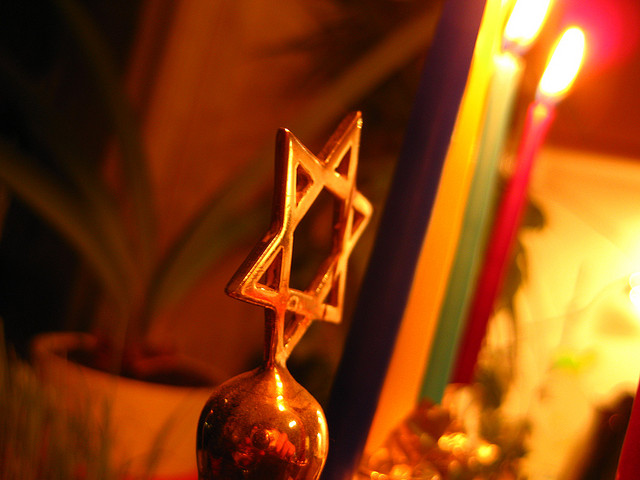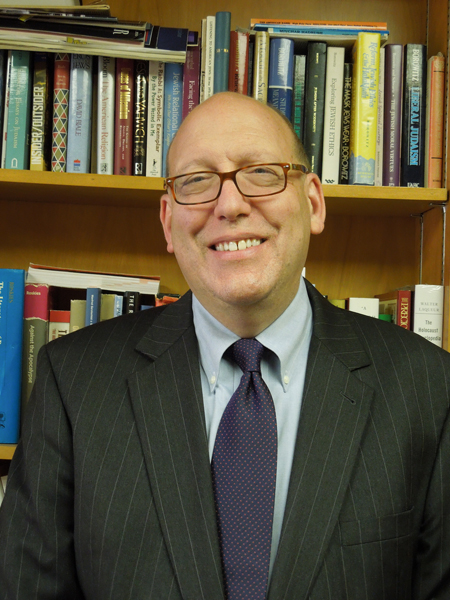
The late Jewish sociologist Marshall Sklare remarked that certain Jewish holidays were destined for American Jewish success.
(RNS) The late Jewish sociologist Marshall Sklare remarked that certain Jewish holidays were destined for American Jewish success. They had to be infrequently observed, child- and family-oriented, and translatable into an American context. Hanukkah, with its focus on religious freedom, was a winner.
That said, for a “successful” holiday, there are still many things American Jews don’t know about Hanukkah. If they did, it would make it even more interesting and compelling.
So, here are eight Hanukkah factoids, one for each night:
1. What miracle of oil? The standard explanation of the Hanukkah story — the Maccabees were about to rededicate the Temple in Jerusalem, which the Greeks had desecrated, and found a cruse of oil sufficient for only one night, yet it lasted for eight nights — may not have ever happened.
In the books of the Maccabees, there is no mention of an oil shortage. That story does not appear until the rather offhand mention of Hanukkah in the Talmud — about six centuries later.
2. Sukkot – better late than never. If the oil story is not true, why did the Jews celebrate the rededication of the Temple for eight days? Because they had been too busy fighting the Greeks in the autumn, and they had not celebrated the eight-day festival of Sukkot, which falls earlier in the year.
3. The Maccabees got screwed. The original account of the Maccabean revolt appears in the books of Maccabees. Those are not in the Hebrew Bible, aka “the Old Testament,” though they do appear in some versions of the Apocrypha, as well as Catholic Bibles. Why didn’t they make it into the Jewish Bible? One reason: The ancient sages who compiled the Bible thought the Hanukkah story was too violent. Plus, for their own political and religious reasons, they weren’t crazy about the legacy of the Maccabees.
4. Judah Maccabee did, however, get into West Point. Judah Maccabee was a brilliant military strategist. So brilliant that there is a statue of him at West Point. Not only that. The Maccabees were such religiously committed warriors that, during the Middle Ages, they actually became the role models for Christian knights.
5. Stephen King, take note. During the Middle Ages, people loved to dramatize the story of the Maccabees in gory theatrical productions. They were so gory that they had to invent a new word to describe them: macabre. Yes, it comes from the word “Maccabee.” Mel Gibson apparently wants to make a movie about the Maccabees. Go for it, Mel. It will make “Braveheart” look like “Love, Actually.”
6. We vant to pump Jew up. For centuries, Jewish men had remained indoors, studying Talmud and having no way to develop their bodies other than lifting Torah scrolls (not too shoddy, by the way). Along came the early Zionist thinkers, and they were tired of scrawny Jewish guys whose lunch money was being stolen by anti-Semites. Max Nordau, in particular, decided that Jews should become committed to bodybuilding and athletics. He wanted a “muscular Judaism.” And that is how we got the Maccabiah Games — that international athletic competition, the “Jewish Olympics,” which still enshrines the name of those ancient fighters who were “real” men.
7. It’s a Zionist thing. American Jews have observed Hanukkah in some fashion since the time of their first settlement in the United States. It was a nice holiday. But in the last 70 years or so, it has become much more important. Why is that? Is it simply the gifts and “proximity to Christmas”? Actually, no. We can trace the renewed popularity of Hanukkah to the creation of the modern state of Israel. Israel celebrated Jewish valor and survival, and thus elevated Hanukkah from its position as a third-rate, minor festival into something bigger and better.

Rabbi Jeffrey Salkin is the spiritual leader of Temple Beth Am in Bayonne, N.J., and the author of numerous books on Jewish spirituality. Photo courtesy of Jeffrey Salkin
8. It may be the most important holiday in the Western world. Yes, that would be Hanukkah. Why? Had the Maccabees lost the battle to the forces of Hellenism, Judaism might have vanished, along with a bunch of other ancient Middle Eastern religions. Had the Jews disappeared, there would have been no Jesus of Nazareth, no Christianity — who knows? Maybe no Islam, either. We might all be wearing togas now and moussaka would be the American national dish.
Tell that to your friends. Hanukkah: the Rodney Dangerfield of Jewish holidays, no more. Let’s show it some respect.
(Jeffrey Salkin is the rabbi of Temple Beth Am in Bayonne, N.J. He is the author of numerous books on Jewish spirituality.)
YS/MG END SALKIN




